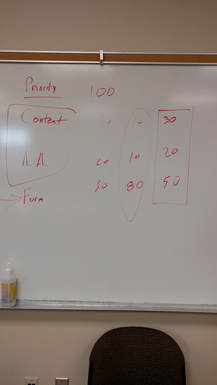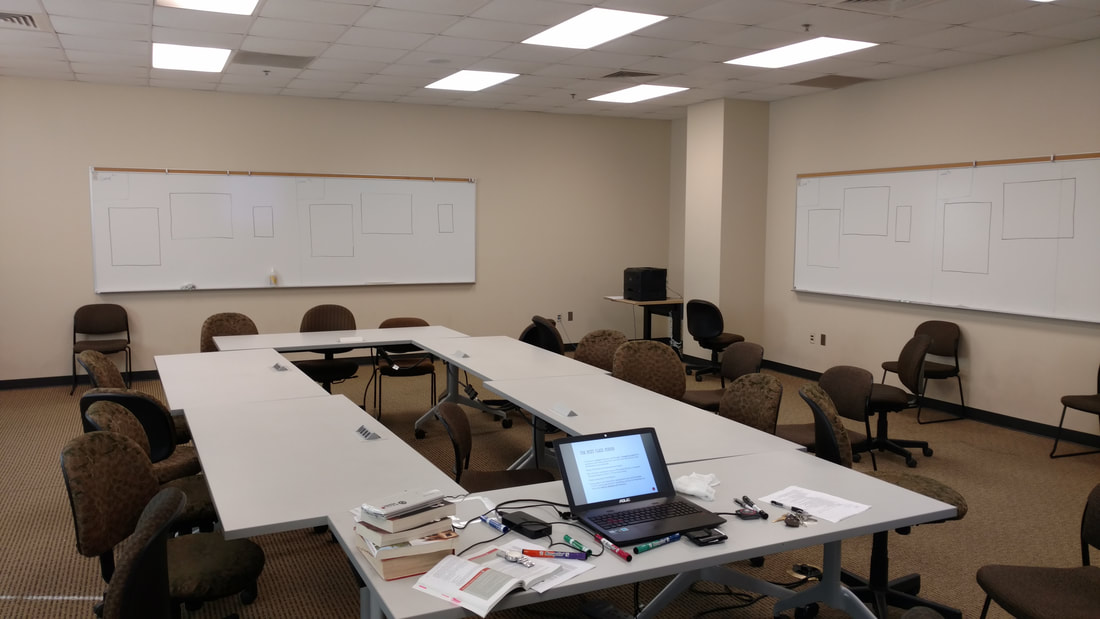Most of my students are in the field of business, trekking dutifully, twice a week, to the English/Philosophy building. They have taken a number of courses on presentations and public speaking, especially in business contexts. They are juniors and seniors and so, at this point, have given a number of presentations of their individual and group projects throughout their coursework here at Tech.
I had thought of several activities we could do where students engage in micro-presentations and then use the follow up critique and discussion as a way to explore how professional reporting orally relates to the concepts we had explored in class. But my concern was that the amount of time this could take, given our obligations to meet other course objectives, wouldn't leave us enough time for--or worse, wouldn't naturally lead us to--a discussion about how the professional oral report is both rhetorical and related to the previous written work they had done. My fear was also that we'd get hung up on the micro-physics of presenting: how should I stand, should I use note cards, how do I cope with pre-presentation jitters, do I have to dress up, and so on.
Whenever I am struck by some conundrum regarding what I want students to learn and the limitations I face in helping them learn it, I often try to make that visible and invite students to think through the challenge with me. It isn't always helpful for students to see the pedagogical mechanics at work "in" or "underneath" assignments. But I think that--especially with students late in their undergraduate career--it is important to get them thinking in a meta-existential way about what they are doing and why and how the artifice of a class does or does not prepare them to do the thing we're learning about.
So this semester I invited my students to co-create the rubric for the oral presentation with me. I told them that of course it would be easier for them (and me, frankly), if I just sat down and wrote out what I expected of them for the assignment. I told them that some instructors have an enormous amount of courage and co-create entire course syllabi with their students. While I don't have that kind of courage, I thought this would be an opportunity to practice a kind of shared power in evaluating that I hope to move towards more and more as I grow as an instructor.
Make no mistake, it was a bit of an anarchic day in the classroom. Students, recognizing that they have been given a chance to shape how they are evaluated, in a perfectly reasonable attempt to conserve their own energy, tried at first to insist on criteria that they think will be "easier" to complete than others. I have no stones to throw, what instructor hasn't themselves taken the easier path when it comes to assignments?
But I began by asking students to confront head on what they'd been told about presenting previously. What had been emphasized? What do they remember?
Then I invited them to think about this assignment, the oral presentation of their recommendation proposals to be submitted at the end of the term. I asked them: Based on what we've talked about in this class, what should be your focus in this assignment and my focus for evaluating you? I then asked them to come up with criteria for evaluating those points of focus. They then had to prioritize the areas of focus and ultimately divvy up the 100pts allotted to the assignment.
While it took a little doing, in both sections we very quickly got to a discussion about the relationship of form and content, the rhetorical nature of both, and what might be important about presenting orally vs. a written context.
My heart was warmed when, somewhat independently, they recognized that just getting the content straight wasn't really the point of the exercise. But what was important was precisely their ability to clearly, concisely, and professionally present that content in a way that their audience for their proposals recognized as such. They made the connection between the rhetorical approach to writing and the oral presentation.
It was also very much baby steps towards something for me as an instructor that I want for my students, my classrooms, and myself--the classroom as a place of shared inquiry, where our work as co-learners is governed less by formal, reductive evaluation tools (points, letters, etc.) and more by skills of thought and practice that are deeper and more complex than we are used to.



 RSS Feed
RSS Feed